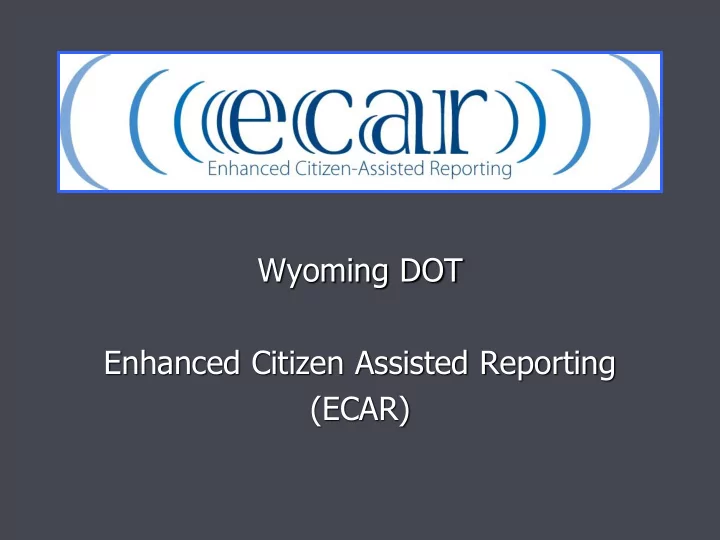

Wyoming DOT Enhanced Citizen Assisted Reporting (ECAR)
Origin ► Recognized that we have many systems to get information to public Numerous roadside ► DMS ► HAR Pre-trip information systems ► 511 Notify (Email/Text via GovDelivery) ► 511 telephone ► Website
Origin (cont.) ► Needed a better way to get timely and accurate source information ► Options More maintenance reports – costly More sensors – costly and limiting Citizens – inexpensive and flexible
History ► Previous attempts had been made to solicit reports from citizens ► Attempts lacked structure and formal training
Pilot Project 2005 ► Began with development of training program ► Asked maintenance workers to view photos and evaluate conditions ► Found inconsistencies among plow operators
Pilot Project (cont.) ► Began with a single district and a small number of volunteers ► Met with volunteers and maintenance workers ► Contentious first meeting – axes to grind
Pilot Project (cont.) ► Trained maintenance workers as well as volunteers ► Season results: 100% success ► Formed relationships and gained mutual respect
Training
Overall Goals ► To provide consistent, reliable, accurate and timely information concerning roadway conditions to the traveling public. ► During the year, we will be using road condition reports from private citizens to augment our public information systems. The information will be used on our website and our phone system.
Overall Goals ► This project is NOT for you to dispatch plow operators. The snow plan (priority routes) will be discussed later in the presentation. ► This project IS for you to assist other citizens by providing timely and accurate information based on your observations.
Safety ► Important - Please ensure your safety at all times and do not report conditions while driving. Studies show that accidents occur more frequently when the driver is inattentive. Please buckle up and don’t dial and drive.
What To Report
Types of Information to Report ► Pavement conditions ► Weather conditions ► Dead animal on the traveled way ► Breaches in the right-of-way fencing ► Rock fall or other debris on roadway ► Report incorrect information on: Highway Advisory Radios (HAR) Dynamic Message Signs (DMS) Flashing Beacon Systems ► Other as deemed important
Emergency ► Important - In the event of an emergency or if you have witnessed a crash, please contact 800-442-9090 or 307-777-4321, directly. Emergencies should NOT be reported to the road report call taker.
Training ► Definitions for road and atmospheric conditions Critical for consistency ► Cues Delineator post spacing ► Condition photos
Weather
Weather
Weather
Weather
Weather
Snow Plan
Snow Plan Interstates and some Primaries Ia Operations: 24 hrs/day (as needed) Goal: Clear road High volume Primaries and Secondaries Ib Operations: 20 hrs/day (as needed) Goal: Safe movement of traffic at restricted rate Most Primaries and Secondaries II Operations: 16 hrs/day Goal: Safe movement of traffic at restricted rate
Snow Plan Primary/Secondary routes with local traffic IIIa Operations: 2x per 8 hr shift Goal: Min Service for traffic observing reasonable speed Primary/Secondary routes with least traffic IIIb Operations: Varies Goal: Provide service as time allows Routes seasonally closed for winter IV Operations: Varies Operations: Treated after all other routes
Typical Snow Plan with Roads
How to Report
Reporting Process ► We welcome your reports on routes you are designated to cover and any route where you may see a problem. ► Please provide the call taker Your name and access code Type of vehicle you are driving Your call back telephone number Direction of Travel and Direction of Impact The route and milepost range of the event A detailed description of the witnessed event ► In some cases, a call taker may not be present. Please leave a message with the detailed information, if necessary.
Route and Milepost ► Route: Interstate U.S. Route Wyoming or State Route ► Route Number ► Direction of Travel will be: Increasing milepost Decreasing milepost Both – events that affect both directions ► Example: US 20 at milepost 150 in the increasing milepost direction.
Benefits ► Cost effective ► Engages public ► Helps to meet CFR 511 ► Much improved consistency – internally ► More timely and accurate information
Future ► Worked with Utah and Idaho ► Will be pursuing Utah mobile app May incorporate this app into plows ► AVL ► Real-time condition information ► Plow-based weather sensors Provide app for citizens ► Location-based images?
Advice/Recommendations ► Get maintenance on board with program ► Program can be used to build public support ► The Program works
Questions
Recommend
More recommend